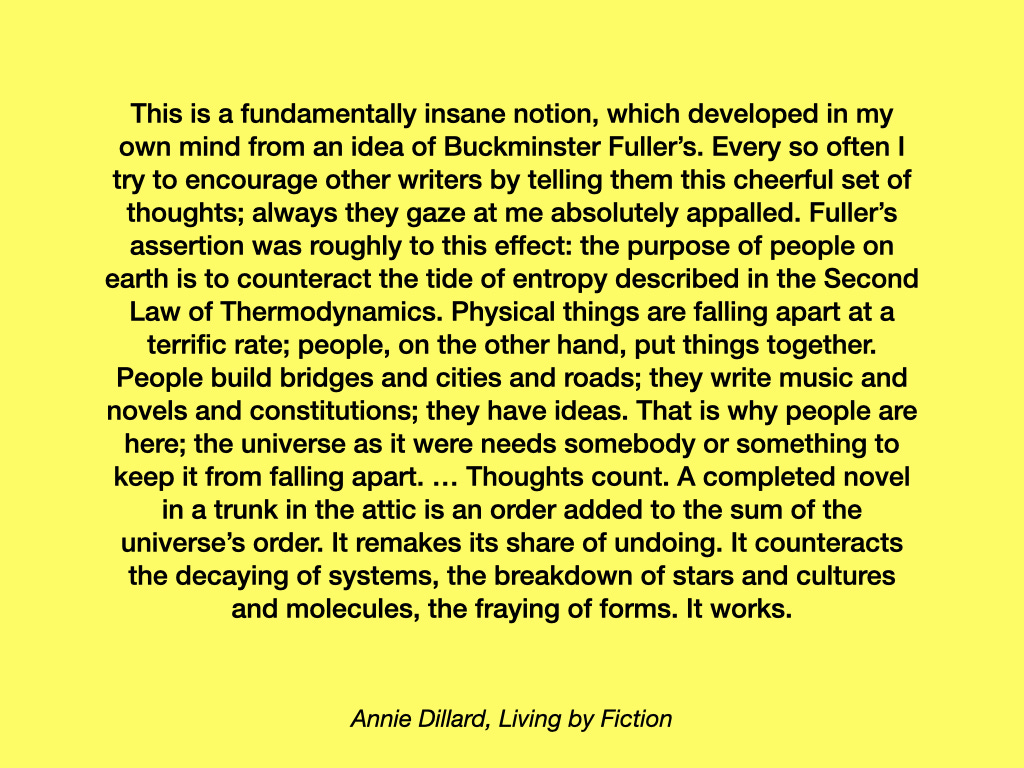Should You Sell Direct? Lesson 2
The difference between an essay, a review or op-ed—well, you get my drift—and super-good narrative: story or memoir.
Not saying here that great essays and op-eds shouldn’t be read. They should!
Let’s talk!
I’m saying they work differently than memoir and fiction for this reason:
Fiction doesn’t “sell direct.” Essay does. Op-eds in the newspaper sell direct. They’ve got a point and the writer wants to make that point.
If your story or memoir isn’t working, here’s one main reason:
Your story may wear the clothes of fiction: You’ve got character and scene and conflict, but if it’s pretty clear to me where you’re going all the way along, why should I go on the journey?
When I read an op-ed or even a movie review, I know pretty quick what the point is. I keep reading because I wanna know all the writer’s reasons for coming to that conclusion.
Now, to be clear, when I get even more super nitty gritty, I’m gonna ask for a small fee to help you and me (time and effort)—and, yep, I will answer every q. that comes my way. To get it all, including stories that teach us and writing experiments that build on each other, go paid.
I’ll be teaching how to write memoir and fiction—and explaining the difference, but I’ll also intersperse this continuing course with essays under the section: “Essays on the arts, film”: see the top line of “Only Connect ...”.
Why? 'Cause maybe you wanna sell direct: Write super essays—or start a blog or make what you have even better.
Good flicks and good stories don’t work that way. Okay, okay, formula rom-coms, like the one we’re gonna study in Chapter 3 here do, but are so clever in doing so, we watch for the joy of how we get to girl meets boy and a happy ending!
Before we take on the assignment from Lesson 1,
let’s talk about two more flicks with fab scripts and what makes them work. As I post this essay/review of sorts, I’m gonna explain, ever so briefly here, how I wrote it and ask YOU some questions.
Ask me some, too! Here’s my essay:
My title: Margin Call and Moneyball: Films about money?
Note: Here are some key words: Brad Pitt, Robin Wright, Jonah Hill, Phillip Seymour Hoffman, Jeremy Irons, Paul Bettany, baseball, the economy, love, lose and win.
No matter what you’re writing, Titles make a difference. Get one that pulls your reader in.
Read this essay that sells direct. Disagree with me. Ask questions.
Here we go (with a writer q. or two inserted inside):
Margin Call and Moneyball: Films about money?
Margin Call and Moneyball, two films from 2011 with money central to the narratives, focus the camera lens on love.
Q: What did I just do in the title: I ask a question. What I’m doing is making you think this: Are these two films about money? –even if ostensibly they are.
These two flicks are flip sides of each other: one with love missing; the other with love surprisingly present.
Table of Contents for all 19 Lessons
Margin Call is a movie not-so-loosely based on Lehman Brother’s choice to start a ball rolling down hill that took the economy – and you and me – with it. You might see the film for the cast alone: Kevin Spacey (yeah, yeah, now much maligned—but geez, wasn’t he great in this flick? Yes, you get to argue with me about that in this ‘me-too’ movement that is so important) Stanley Tucci, Jeremy Irons, Paul Bettany, Simon Baker, Demi Moore and newcomer-then! Zachary Quinto, who gave a startling, quiet performance.
Eric Dale, played with stunning restraint by Stanley Tucci, begins the downhill spiral with his risk-strategy research on his company’s portfolio before he is canned. On his way out the door with his nineteen years at the firm in one banker’s box, all that he’s allowed to take, Eric hands Zachary Quinto’s character Peter Sullivan a flash drive with the analysis he’s been working on and says, “Be careful.”
With that phrase as the elevator doors close, this movie gets rolling.
The movie is all about the money, some about the ethical questions that carry the conflict, and finally about the spiral that digs a hole in the economy that just keeps digging.
The film’s coup is its ability to build empathy for the brain trust that figured out how the U.S. economy would spiral out of control and then set the spiral on its downward course.
The critics did not include the word love in any of their columns about Margin Call.
Love underlies this film in two ways: First, it’s missing and that makes you think.
A world without love is vacant, soulless.
Second, to remind the viewer of that key point, the writer and director add a moment of tenderness between Peter (Zachary Quinto) and Kevin Spacey who plays Sam Rogers, Peter’s boss, the next big guy up the corporate ladder after Eric Dale leaves.
We get to know this hierarchy well by movie’s end: Jeremy Irons flies in like a king in his helicopter-chariot to set the downward spiral on its spin.
Sam Rogers and Eric Dale hold the humanity of the film — to the extent that the humane is given space inside this frame. The moment between Sam and Peter is easy to miss: Watch for the cigarette smoked in the early morning and Peter’s inquiry about Sam’s son.
Love lies there and merits our attention for its brevity and its recall at film’s end.
The antithesis of Margin Call is Moneyball.
Moneyball appears to be all about the money and instead is all about love. I saw it before the 2011 World Series began. Its timeliness as the series wound to its end made this flick a must-see that year. It’s timeless struggle makes it a see-again.
Brad Pitt plays Billy Beane, real-life general manager of the Oakland A’s, and gives a performance that wouldn’t let anyone call him “pretty boy” again. Beane hires brainy, Yale-educated Peter Brand, played with unabashed vulnerability by Jonah Hill, who does statistical analyses of players’ strengths and weaknesses with a focus on what they can do, not what they can’t.
Beane, short on the money needed to compete for talent, with Brands’ help, re-evaluates how baseball managers trade players, set their positions and win based on statistical analyses.
Aaron Sorkin collaborated on the screenplay, based on the book by Michael Lewis. When Sorkin is involved, layered conflict deepens and good writing gets struck. A Few Good Men and Social Network are two of a plethora of examples of his work.
In Moneyball, the relationship between Beane and Brand drives the film’s screenplay. The penultimate climax occurs when the statistician Brande shows the discouraged Beane a film clip of a player doing what no one thought he could do. The viewer soon sees that the narrative arc is less about money, less about statistical reasoning and more about what can be done against all odds.
Unspoken love lies between Beane and Brand. Beane teaches Brand how to do the hard stuff, including letting a player go and negotiating a trade. Brand through the video he shows Beane expresses his empathy for what Beane has done and who Beane wants to be. It is no small reality that Beane never “made it” as a player and that he forcefully “makes it,” in the best sense of that phrase, as a human being, as an empathic, loving man.
No need at either of these films’ end to state Freud’s adage: “Love and work are the cornerstones of our humanness.” Both strike that chord.
Margin Call deals with home mortgages in the literal sense: What got the economic spiral on its course. Work and home are struck here too in that when fired that’s where we go. In the figurative sense, the film strikes the chord that work-as-home is a misplaced value.
Moneyball effectively belies its title by taking us home in the literal and figurative senses. Ultimately, Beane chooses work and love and breaks our hearts with Brad Pitt in full control of the role and the humanity that defines love.
In the novel You Can’t Go Home Again,
Thomas Wolfe says, Because you have known madness and despair, and because you will grow desperate again before you come to evening, we who have stormed the ramparts of the furious earth and been hurled back, we who have been maddened by the unknowable and bitter mystery of love … take heart.
Take heart in these two films. Discover love’s absence and presence in the human struggle called life.
Let’s close with a quote by another of my favorite writers — to encourage, to make you believe and keep going—even when the going gets rough:
Click➡️ Lesson 3: The Writer as Director
Table of Contents for all 19 lessons
Credits:
Note: Banner for lesson 2 by Shannon Kellie
Image for Selling Direct: “ecommerce” by Mediamodifier via Pixabay.com
Annie Dillard, Living by Fiction, Harper & Row, 1982
Note to readers: If you want to work one-on-one with me, I’m still offering that option. For a small fee, via Zoom, you will get an eight-"session"-course—or more if you want them (each session includes 11 parts) with slides, experiments and much more content than in the chapters in this Substack course.
Email me at
mltabor@me.com
for details on how I work and we'll set up lessons.









I definitely agree about the importance of titles. They've also been shown to be highly influential in the way that people frame news articles they read. (I reported on this a few years ago: https://www.teachwire.net/news/read-between-the-lines-how-the-news-machine-mangles-reporting-on-education/ )
But it's fascinating to me that a title might actually be the opposite of what the story is about, or at least not give the full picture, like Moneyball
A feed years ago I read a sci fi story called Happy Ending, and as you read the story you realised that was anything but.
Great food for thought, Mary, thanks!
Another great article, thanks Mary.
I had never given a thought about the importance of titles till recently but it could make the difference between a reader picking up the book or not (zapping if it's an article.)
Enjoy reading the quotes too.